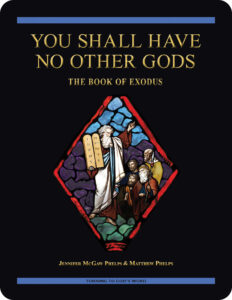 You Shall Have No Other Gods:
You Shall Have No Other Gods:
The Book of Exodus
Lesson 12 Deliverance Through the Red Sea
the book of Exodus 13:17—14:31
Revised Standard Version Catholic Edition (RSVCE)*
New American Bible Revised Edition (NABRE)*
Catechism of the Catholic Church
ex libris (in our library)
glossary for the book of Exodus
cross references in the book of Exodus
next lesson: Song of Moses & Song of Miriam
This material coordinates with Lesson 12 on pages 58–63 in the study book You Shall Have No Other Gods: The Book of Exodus.
And God spoke all these words, saying, ‘I am the LORD your God, who brought you out of the land of Egypt, out of the house of bondage. You shall have no other gods before me. You shall not make for yourself a graven image, or any likeness of anything that is in heaven above, or that is in the earth beneath, or that is in the water under the earth; you shall not bow down to them or serve them; for I the LORD your God am a jealous God, visiting the iniquity of the fathers upon the children to the third and the fourth generation of those who hate me, but showing mercy to thousands of those who love me and keep my commandments.”—the book of Exodus 20:1–6
welcome to our in-depth study of the book of Exodus
We invite interested groups and individuals to check out the sample first lesson from this 28- lesson Turning to
lesson Turning to  God’s Word Catholic Bible study. These online study pages link to our free lesson video overviews, as well as to a glossary and cross references in the biblical text. Other study aids include maps, additional commentary, and prayers based on the primary Scripture in each lesson. You Shall Have No Other Gods: The Book of Exodus has been granted an imprimatur and can be purchased from our website shop. If you have a Bible-study question or comment, click on one of the “ask us your question” or “what do you think” buttons on any online study page.
God’s Word Catholic Bible study. These online study pages link to our free lesson video overviews, as well as to a glossary and cross references in the biblical text. Other study aids include maps, additional commentary, and prayers based on the primary Scripture in each lesson. You Shall Have No Other Gods: The Book of Exodus has been granted an imprimatur and can be purchased from our website shop. If you have a Bible-study question or comment, click on one of the “ask us your question” or “what do you think” buttons on any online study page.
open with prayer
It’s always wise to begin any Bible study with prayer, whether reading the Scriptures alone or meeting with others in a discussion group. You can pray using your own words or use one of the opening prayers on our website. We especially like the following:
Lord Jesus, you promised to send your Holy Spirit to teach us all things.
As we read and study your word today,
allow it to touch our hearts and change our lives. Amen.
let’s review—the book of Exodus 12:29—13:16
In Lesson 11 Final Plague: Death of the Firstborn, the tenth plague occurs. Every first-born male, animal and human, dies—except Hebrews who have followed the LORD’s instructions concerning how they were to prepare to be spared. A great cry is heard in Egypt, and Pharaoh summons Moses and Aaron in the night to insist that they and all of the sons of Israel leave immediately, along with their families, flocks, and herds. In a surprising twist, Pharaoh also asks that Moses bless him. The Egyptians make a startling statement—”We are all dead men.” Although they fear physical consequences if the Israelites aren’t allowed to leave Egypt, the Egyptians’ statement also reflects the reality of their spiritual situation. That the Israelites have no time to bake bread indicates the speed with which they’re expected to leave. The night of the first Passover is described as “a night of watching by the LORD.” God issues strict rules about celebrating the Passover in the future. The most serious rule appears to be that no foreigner may eat the Passover meal. The LORD also stresses that the firstborn of the Israelites, as well as of their flocks and herds, are owed to God and must be sacrificed or redeemed. This establishes the idea of redemption—that the life of an animal may be traded for a life owed to God.
they went up out of Egypt
The book of Exodus 13:18 records that “the people of Israel went up out of the land of Egypt equipped 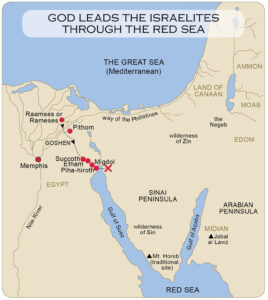 for battle.” Because the Israelites are heading for the Promised Land of Canaan, they are headed “up.” Present-day readers are unlikely to find this alarming since a large portion of the land of Canaan is slightly north of Egypt on the map, and so appears to be “up” in regard to the location of Egypt. Geographically, a large portion of Egypt would be at sea level, also suggesting that leaving Egypt would require the Israelites to travel “up.” While parts of the land of Canaan are indeed at a higher altitude than Egypt, the Dead Sea also is located in the land of Canaan and this body of water represents the lowest spot on the planet. Throughout Scripture, anyone journeying to Jerusalem or the Temple there is said to be going “up,” regardless of what direction they’re traveling from on a map. At the time of the Exodus, Jerusalem was a Jebusite stronghold and hadn’t yet been conquered by David, and the Temple at Jerusalem hadn’t yet been built
for battle.” Because the Israelites are heading for the Promised Land of Canaan, they are headed “up.” Present-day readers are unlikely to find this alarming since a large portion of the land of Canaan is slightly north of Egypt on the map, and so appears to be “up” in regard to the location of Egypt. Geographically, a large portion of Egypt would be at sea level, also suggesting that leaving Egypt would require the Israelites to travel “up.” While parts of the land of Canaan are indeed at a higher altitude than Egypt, the Dead Sea also is located in the land of Canaan and this body of water represents the lowest spot on the planet. Throughout Scripture, anyone journeying to Jerusalem or the Temple there is said to be going “up,” regardless of what direction they’re traveling from on a map. At the time of the Exodus, Jerusalem was a Jebusite stronghold and hadn’t yet been conquered by David, and the Temple at Jerusalem hadn’t yet been built  by David’s son Solomon. You can learn more in the Turning to God’s Word Catholic Bible study, The United Kingdom of Israel: Saul, David & Solomon Foreshadow Christ the King. Click on the map (above right) to enlarge it. The original map is on page 60 in You Shall Have No Other Gods: The Book of Exodus.
by David’s son Solomon. You can learn more in the Turning to God’s Word Catholic Bible study, The United Kingdom of Israel: Saul, David & Solomon Foreshadow Christ the King. Click on the map (above right) to enlarge it. The original map is on page 60 in You Shall Have No Other Gods: The Book of Exodus.
 the LORD arranges for the Israelites to escape through the Red Sea (50:45)
the LORD arranges for the Israelites to escape through the Red Sea (50:45)
The fourteenth chapter in the book of Exodus describes the dramatic passage of  the Israelites through the Red Sea, and it includes an account of the deaths of the Egyptians who follow them into the water. Prior to that, the end of the thirteenth chapter in the book of Exodus describes two moderately important things that Turning to God’s Word author Matthew Phelps discusses: 1) It’s intentional when God decides to lead the Israelites to the Promised Land of Canaan by a circuitous route. 2) When the
the Israelites through the Red Sea, and it includes an account of the deaths of the Egyptians who follow them into the water. Prior to that, the end of the thirteenth chapter in the book of Exodus describes two moderately important things that Turning to God’s Word author Matthew Phelps discusses: 1) It’s intentional when God decides to lead the Israelites to the Promised Land of Canaan by a circuitous route. 2) When the  descendants of Jacob leave Egypt, they take with them the bones of Joseph. What might explain why these details are significant?
descendants of Jacob leave Egypt, they take with them the bones of Joseph. What might explain why these details are significant?
oops—Matthew misspeaks on the video
Around 48 minutes and 20 or so seconds into the video overview for this lesson, Matthew once again says the opposite of what he means. He knows better, but we neglected to catch this one when we were shooting. We apologize for any confusion.
The Scripture ranges for the videos that accompany this Catholic Bible study from Turning to God’s Word match the Scripture ranges for the sets of questions in You Shall Have No Other Gods: The Book of Exodus. You can follow along as Turning to God’s Word author Matthew Phelps discusses Lesson 12, “Deliverance Through the Red Sea,” on pages 58–63 in the study book.
baptism—you could look it up in our archives
The fourteenth chapter in the book of Exodus introduces an important instance of foreshadowing in  Scripture. When the Israelites are delivered from the Egyptians, the crossing of the Red Sea is seen as a powerful type of the Christian sacrament of Baptism. To learn how the New Testament writers treat the baptism of Jesus in the Jordan River, read Lost in Translation, an online column in which Turning to God’s Word author Matthew Phelps helps readers connect with ideas expressed in the original languages of the Scriptures. New Lost in Translation entries are posted on Mondays, and past entries are archived on our website. Contact us if you’d like to receive Lost in Translation by email every week.
Scripture. When the Israelites are delivered from the Egyptians, the crossing of the Red Sea is seen as a powerful type of the Christian sacrament of Baptism. To learn how the New Testament writers treat the baptism of Jesus in the Jordan River, read Lost in Translation, an online column in which Turning to God’s Word author Matthew Phelps helps readers connect with ideas expressed in the original languages of the Scriptures. New Lost in Translation entries are posted on Mondays, and past entries are archived on our website. Contact us if you’d like to receive Lost in Translation by email every week.
the Israelites are equipped for battle
It’s easy to overlook the significance of the book of Exodus 13:18, which describes the Israelites leaving Egypt prepared to do battle. This verse suggests several things that might have been true about the Israelites at the time. For more information, check out the commentary, “The Sons of Israel Left Egypt Equipped for Battle,” on page 62 of You Shall Have No Other Gods: The Book of Exodus.
? What does this verse imply about what the Israelites expect on their journey to the  land of Canaan?
land of Canaan?
? Is it reasonable for the Israelites to assume they might run into trouble once they leave Egypt?
? What does this verse imply about the Israelites’ relationship with the LORD?
? What does it suggest about how the Israelites view the 10 plagues that have led Pharaoh to allow them to leave Egypt?
what Matthew says—passing through the Red Sea is critically important
In the video for this lesson, Turning to God’s Word author Matthew Phelps points out that the typology of passing through the Red Sea in the fourteenth chapter in the book of Exodus as a type of the  sacrament of Baptism may not be obvious. The Egyptians represent slavery to sin. The
sacrament of Baptism may not be obvious. The Egyptians represent slavery to sin. The  waters of the Red Sea in this case are fascinating in that they represent both life and death. The Israelites pass through the water as though on dry land and find freedom and life. The Egyptians find only death. The single significant difference between the two peoples is that the Israelites belong to God—and at this stage this has been by God’s decision. The Israelites certainly haven’t done anything to merit relationship with the LORD. They’re related to previous individuals who knew and served God, however, and for this reason they’ve inherited access to the Promised Land (both to the land of Canaan and, more importantly, to the Promised Land of heaven). The waters of baptism give both life and death—what belongs to God receives life and everything else enters death. Belonging to God through baptism cannot possibly be earned or deserved in advance. It’s only after the gift is given that Christians have any chance of earning a place in the LORD’s family, and then only by virtue of the gift of grace freely given by God. Human free will enables each person to choose to accept or reject this gift.
waters of the Red Sea in this case are fascinating in that they represent both life and death. The Israelites pass through the water as though on dry land and find freedom and life. The Egyptians find only death. The single significant difference between the two peoples is that the Israelites belong to God—and at this stage this has been by God’s decision. The Israelites certainly haven’t done anything to merit relationship with the LORD. They’re related to previous individuals who knew and served God, however, and for this reason they’ve inherited access to the Promised Land (both to the land of Canaan and, more importantly, to the Promised Land of heaven). The waters of baptism give both life and death—what belongs to God receives life and everything else enters death. Belonging to God through baptism cannot possibly be earned or deserved in advance. It’s only after the gift is given that Christians have any chance of earning a place in the LORD’s family, and then only by virtue of the gift of grace freely given by God. Human free will enables each person to choose to accept or reject this gift.
more about signs
The book of Exodus 14:30–31 makes a bold statement about signs when it records that the Israelites saw and believed in the LORD and in Moses once God destroys the Egyptians in the Red Sea. The biblical text strongly suggests that anyone needing advance signs in order to bolster their faith doesn’t really have faith. There are no signs that will create faith where none exists. If, however, an individual has faith, it will be apparent that the LORD is behind any number of actions that then bolster the faith or trust in God that previously existed.
oops—a correction in the study book
Despite our best efforts, a few typos always sneak past us in the first edition of our studies. Future printings will correct the biblical text for the book of Exodus 14:21 on page 59 of You Shall Have No Other Gods: The Book of Exodus to read: “Then Moses stretched out his hand over the sea; and the LORD drove the sea back by a strong east wind all night, and made the sea dry land, and the waters were divided.“ We apologize for the error.
t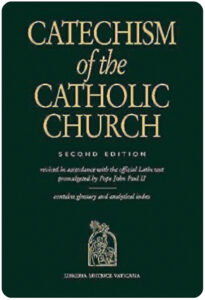 he best Catholic commentary about Scripture
he best Catholic commentary about Scripture
To find out more about how Church teaching is supported by Scripture passages in You Shall Have No Other Gods: The Book of Exodus, check out the Index of Citations in the Catechism of the Catholic Church. Links (Revised Standard Version Catholic Edition [RSVCE*]) to the primary Scripture passages in the lesson and relevant paragraphs in the Catechism are provided here. Not every passage in the biblical text for this Catholic study is referenced in a Catechism paragraph, however.
the book of Exodus 13:1–22—paragraph 1363
the book of Exodus 13:22—paragraph 659
ways our glossary might prove helpful
In addition to providing extra information about geographical locations, our glossary also points out  when a person or place is mentioned in the biblical text under more than one name or more than one spelling. If you can remember a name but aren’t sure in which lesson it shows up, you can find it in the glossary, which lists every proper noun that appears in the biblical text for every lesson in You Shall Have No Other Gods: The Book of Exodus.
when a person or place is mentioned in the biblical text under more than one name or more than one spelling. If you can remember a name but aren’t sure in which lesson it shows up, you can find it in the glossary, which lists every proper noun that appears in the biblical text for every lesson in You Shall Have No Other Gods: The Book of Exodus.
to learn more, read more Scripture
If you’re having difficulty with a particular passage of Scripture, it can be helpful to read the relevant  cross references—but looking these up can take time. To make that easier, we’ve compiled the cross references from the Revised Standard Version Second Catholic Edition (RSV2CE)—the translation that we reprint in our study books. That list can be found at the top of every online study page accompanying this study, and it includes links to each of the cross references in the primary biblical text for You Shall Have No Other Gods: The Book of Exodus.
cross references—but looking these up can take time. To make that easier, we’ve compiled the cross references from the Revised Standard Version Second Catholic Edition (RSV2CE)—the translation that we reprint in our study books. That list can be found at the top of every online study page accompanying this study, and it includes links to each of the cross references in the primary biblical text for You Shall Have No Other Gods: The Book of Exodus.
don’t forget about our indexes & extra online material

 If you’re trying to locate information about a specific Scripture passage, you can look it up in the index at the back of the study book or sample lesson. If you want to find a particular commentary, you can look up its title in the topics index. To learn more about another book of the Bible for which there’s a Turning to God’s Word study, visit the online study directories to read the commentaries and watch any accompanying videos. Finally, if you have a question or would like to make a comment about any of our studies, you can use one of the “ask us your question” or “what do you think” buttons to email our authors.
If you’re trying to locate information about a specific Scripture passage, you can look it up in the index at the back of the study book or sample lesson. If you want to find a particular commentary, you can look up its title in the topics index. To learn more about another book of the Bible for which there’s a Turning to God’s Word study, visit the online study directories to read the commentaries and watch any accompanying videos. Finally, if you have a question or would like to make a comment about any of our studies, you can use one of the “ask us your question” or “what do you think” buttons to email our authors.
ex libris—Church documents & books about religious topics
Link to magisterial documents referred to in our Bible studies at ex libris—magisterial documents.  This listing includes significant recent encyclicals as well as a number of historical Church documents. Recommended books related to Scripture study can be found at ex libris—main bookshelf.
This listing includes significant recent encyclicals as well as a number of historical Church documents. Recommended books related to Scripture study can be found at ex libris—main bookshelf.
wondering how to pronounce some of these words?
The following link is to a reading from the New International Version (NIV) Bible. To listen, open the link and click on the audio icon above the printed text. Although not taken from the translations used in our study materials, the NIV reading provides an audio guide to pronunciation of words in this lesson’s primary biblical text. A close online version of the translation of the Bible used in Catholic liturgy in the United States as well as an audio guide for daily Mass readings for the current month can be found on the website of the United States Conference of Catholic Bishops (USCCB).
the book of Exodus 13:17—14:31 (NIV)
 close with Bible-based prayer related to this lesson
close with Bible-based prayer related to this lesson
Many of our Catholic study groups like to conclude their discussions with a prayer based on the scriptural focus of their lesson, and some participants include Scripture-specific prayer in their individual study. If you’re uncomfortable composing your own Bible-based prayers, you can follow our four easy steps. If you prefer, you can use the following short prayer based on this lesson’s text from the book of Exodus.
O God, you led your people to safety through the Red Sea
to demonstrate your love and fidelity.
Grant that we will be able to trust that this same love and fidelity
extends to all of your people in the present day.
Enable us to honor our baptismal promises.
We ask this in the name of Jesus Christ,
who has made our salvation possible. Amen.
Lesson 13 Song of Moses & Song of Miriam, the book of Exodus 15:1–27
Lesson 11 Final Plague: Death of the Firstborn, the book of Exodus 12:29—13:16
you also may like our two-part study of the prophets
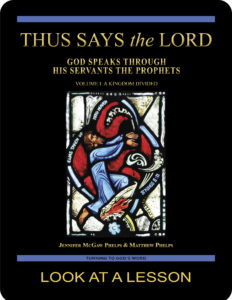
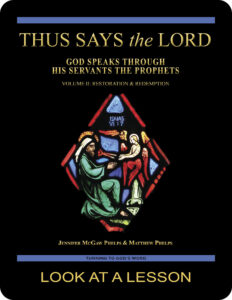 Thus Says the LORD: God Speaks Through His Servants the Prophets—Volume I: A Kingdom Divided examines the prophets in their historical context using the First and Second Books of the Kings and other Old Testament passages written before the Babylonian Exile in 586 B.C. Volume II: Restoration & Redemption looks at the post-exilic prophets. This 51-lesson Catholic Bible study builds on The United Kingdom of Israel: Saul, David & Solomon Foreshadow Christ the King. Click on the books’ covers to view a sample lesson from each volume.
Thus Says the LORD: God Speaks Through His Servants the Prophets—Volume I: A Kingdom Divided examines the prophets in their historical context using the First and Second Books of the Kings and other Old Testament passages written before the Babylonian Exile in 586 B.C. Volume II: Restoration & Redemption looks at the post-exilic prophets. This 51-lesson Catholic Bible study builds on The United Kingdom of Israel: Saul, David & Solomon Foreshadow Christ the King. Click on the books’ covers to view a sample lesson from each volume.
start a Turning to God’s Word Bible study
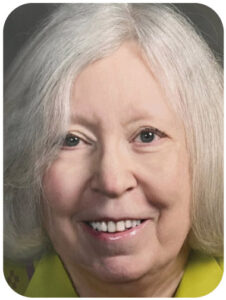 Thank you for your interest in You Shall Have No Other Gods: The Book of Exodus.
Thank you for your interest in You Shall Have No Other Gods: The Book of Exodus.  Information about beginning a Turning to God’s Word Bible study can be found at start a Bible study. Tami, Matthew, and I are available to answer your questions and to offer support. You may use this email to contact us directly if you’re interested in starting a Turning to God study or in having your study schedule listed with other TtGW study groups on our website. —Jennifer
Information about beginning a Turning to God’s Word Bible study can be found at start a Bible study. Tami, Matthew, and I are available to answer your questions and to offer support. You may use this email to contact us directly if you’re interested in starting a Turning to God study or in having your study schedule listed with other TtGW study groups on our website. —Jennifer
*There are seven deuterocanonical books in the Old Testament—the Books of Tobit, Judith, Wisdom, Sirach, Baruch, and First and Second Maccabees, as well as some passages in the Books of Esther and Daniel. Protestants usually refer to these works as “apocryphal,” a word that means “outside the (Protestant) canon” because they’re excluded from most Protestant Bibles. The word “deuterocanonical” means “second canon”; Catholics use that word to refer to any section of the Catholic Old Testament for which there are no extant, or existing, Hebrew manuscripts. All of the deuterocanonical books appear in the Septuagint, the earliest remaining versions of which date to the 1st century B.C. This Greek translation of the Old Testament was in common use by Jews at the time of Jesus—but the same books aren’t found in existing Hebrew manuscripts, which aren’t as old as the oldest version of the Septuagint. Learn more by reading How Do Catholic & Protestant Bibles Differ?
Turning to God’s Word printed Bible studies use the 2006 Revised Standard Version Second Catholic Edition (RSV2CE) translation for all Scripture references except those to the Psalms, which are taken from The Abbey Psalms and Canticles, prepared by the Benedictine monks of Conception Abbey and published in 2020 by the United States Conference of Catholic Bishops (USCCB). All Scripture links for the online study pages for You Shall Have No Other Gods: The Book of Exodus are to the 1966 Revised Standard Version Catholic Edition (RSVCE) translation. The New International Version (NIV) audio recordings follow the same chapter and verse numbering as the RSV Catholic translations, but the NIV translation doesn’t include the deuterocanonical books and passages.
The 1966 RSVCE uses archaic pronouns and verb forms such as “thee,” “thou,” “didst” in the Psalms and in direct quotations attributed to God. The 2006 RSV2CE replaces those with more accessible English. The few significant translation changes in the RSV2CE include rendering almah as “virgin” in the Book of Isaiah 7:14 and restoring the term “begotten” in the Gospel According to John 3:16.
Numbering varies for some passages in this Bible study. Turning to God’s Word studies (print and digital) follow the numbering in the Revised Standard Version Catholic translations (RSV2CE and RSVCE). Discrepancies in the New American Bible Revised Edition (NABRE) are noted in the Index of Scripture Citations in the study book and the online sample.
 You can learn more about the Psalms by viewing a sample lesson from the Turning to God’s Word Catholic Bible study Sing a New Psalm: Communicating with God Through the Prayers of the Church—Volume I: Lauds & Vespers. The second part of that study, Sing a New Psalm: Communicating with God Through the Prayers of the Church—Volume II: Vigils, Day Prayer & Compline, is scheduled for publication in 2025. Some verse numbers may vary in different translations of the Psalms.
You can learn more about the Psalms by viewing a sample lesson from the Turning to God’s Word Catholic Bible study Sing a New Psalm: Communicating with God Through the Prayers of the Church—Volume I: Lauds & Vespers. The second part of that study, Sing a New Psalm: Communicating with God Through the Prayers of the Church—Volume II: Vigils, Day Prayer & Compline, is scheduled for publication in 2025. Some verse numbers may vary in different translations of the Psalms.
